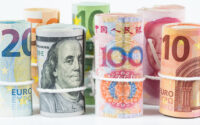- MSCI All-World index hovers near highest since April 2022
- Wall St indexes drop; Europe’s Stoxx gains
- Yen falls to 15-yr low vs euro, 6-month low vs dollar
- US yields rise, Fed officials see more possible tightening
World stocks gauge pauses after big run, heavy central bank week
June 17, 2023
NEW YORK/LONDON, June 16 (Reuters) – A gauge of global stock markets took a breather on Friday after a run to 14-month highs, while the U.S. dollar headed for its biggest weekly slide since January following a heavy week of central bank meetings around the world.
The MSCI All-World index (.MIWD00000PUS) edged down 0.06% but remained near its highest level since mid-April 2022. Wall Street’s main equity indexes ended lower but tallied solid weekly gains.
Ending an intense week of central bank actions, the Bank of Japan maintained its ultra-easy monetary policy on Friday despite stronger-than-expected inflation. Earlier in the week the Federal Reserve kept rates unchanged, while suggesting more hikes could come later in the year, and the European Central Bank hiked by a quarter-point.
“We have had a pretty constructive week,” said Art Hogan, chief market strategist at B Riley Wealth.
“The ECB and the UK likely are still in the process of being in the throes of tightening, where the U.S. is certainly knocking on the door of being through with the rate hiking cycle and I think that has been driving some divergences.”
On Wall Street, the Dow Jones Industrial Average (.DJI) fell 108.94 points, or 0.32%, to 34,299.12, the S&P 500 (.SPX) lost 16.24 points, or 0.37%, to 4,409.6 and the Nasdaq Composite (.IXIC) dropped 93.25 points, or 0.68%, to 13,689.57.
The pan-European STOXX 600 index (.STOXX) rose 0.5%, while Japan’s Nikkei (.N225) rose 0.7% for a 10th straight week of gains.
In currency markets, the dollar index , which measures the greenback against a basket of currencies, rose 0.18%, with the euro down 0.09% to $1.09.
Still, the dollar was set to log its biggest weekly percentage drop since mid-January.
Meanwhile, the yen fell to its lowest point against the euro in 15 years after the BOJ’s decision. The Japanese currency also weakened 1.07% versus the greenback at 141.84 per dollar, dropping to a six-month trough.
“The yen is suffering from a big negative yield gap versus other G10 currencies,” said Vassili Serebriakov, FX strategist at UBS in New York.
U.S. Treasury yields rose, with the benchmark 10-year yield rising after two straight days of declines as comments from Fed officials indicated the central bank was not yet done with its interest rate hikes.
Fed Governor Christopher Waller said at an economics conference that core inflation “is not coming down like I thought it would,” which probably would require more tightening.
Benchmark 10-year notes were up 4 basis points to 3.77% from 3.73% late on Thursday.
Oil prices rose and posted a weekly gain, as higher Chinese demand and OPEC+ supply cuts lifted prices.
U.S. crude settled up 1.6% at $71.78 per barrel and Brent settled at $76.61, up 1.2% on the day.
Reporting by Lewis Krauskopf in New York and Amanda Cooper in London
Additional reporting by Ankur Banerjee in Singapore and Chuck Mikolajczak, Gertrude Chavez-Dreyfuss in New York, Sruthi Shankar and Shristi Achar A in Bengaluru
Editing by Nick Zieminski and Matthew Lewis
Our Standards: The Thomson Reuters Trust Principles.
[ad_2]
Source link


